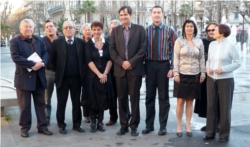
The Independent Ecological Alliance (AEI) brings together Génération Ecologie, the Independent Ecological Movement, and France in Action. The party achieved 4.03% in the PACA region in the last European elections.
No political banner for the AEI, but rather a desire for “open-mindedness, because openness can prevail,” as highlighted by Patrice Miran, the party’s leading candidate. An environmental activist since 1976, he is a Greenpeace facilitator and a co-founder of the Greens. He was elected as a municipal environmental councilor in Vence in 2008.
In second place, Carine Curtet, a municipal councilor in Antibes. An environmental activist, she wishes to “start from real observations and propose creative and different solutions.”
The third place is held by the Mayor of Villars-sur-Var, Edgar Malaussena, who believes “ecology and social issues go hand in hand.”
Dominique Juge is in fourth place. Since 2008, she has been involved with the Independent Ecological Movement. Within her party, she focuses on the relationship between economic growth and ecology as well as sustainable development in companies.
Finally, Lucien Bella occupies the fifth place. In 2008, he headed an Independent Ecological Movement list and obtained 10% of the votes.
The list includes 11 other members, all of whom are associative activists or local elected officials.
What program?
The AEI starts from the alarming observation of the Regional Environment Agency and the National Institute of Statistics and Economic Studies (INSEE): the environmental situation of the region is worsening over time. By 2030, the population density of the region will be close to that of Hong Kong. In the PACA region and in the Alpes-Maritimes, space is limited and more restricted than elsewhere, thus multiplying the risks of natural disasters.
“The AEI does not have all the answers, but we must reverse this trend to regain a balanced region,” explains Patrice Miran. This party proposes to follow some major guidelines and more thematic proposals.
Their program focuses on land planning, transportation, and the development of local energy production.
They therefore propose to encourage municipalities and intermunicipalities to create their own energy production structures. EDF will no longer be the sole operator on the market, as the region will encourage other companies to get involved.
The management of waste will also be modified, with an emphasis on reduction at the source. The production of household waste in the region now exceeds the national average (in 2006: 503 kg/person/year compared to 482 nationally).
For rail transport, the AEI proposes opening up to competition to break away from the exclusivity of SNCF through a regional mixed syndicate. For the High-Speed Line (LGV), investment will be a priority.
But the AEI is also committed to health and animal protection. In terms of health, clinical trials will be financed to test non-allopathic medical practices, that is to say, develop soft medicine.
For animal protection, support will be provided to shelters and all supports for animal cruelty, such as bullfighting, will be banned.
The AEI claims to defend a realistic program in relation to current observations to achieve “a region where life is good today, certainly, but also tomorrow.” It remains to be seen whether the ecological wave will persist in the regional elections. Because, let’s remember, ecologists were the second political force in the region in the European elections.


